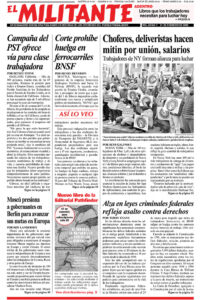MINNEAPOLIS — A crowd of hundreds rallied outside Hennepin County Government Center here Feb. 5 to protest the cop killing of a young Black man, 22-year-old Amir Locke.
In the early morning Feb. 2 a Minneapolis Police Department SWAT team broke into a downtown apartment using a key to the front door and a “no-knock” warrant. Locke was fast asleep on a couch when the officers burst in, shouting.
One kicked the couch Locke was asleep on, and Locke, under a blanket, moved and showed a gun in his hand. Released police body camera footage showed the gun was pointed down and Locke’s trigger finger was along the barrel, not on the trigger. Cops immediately fired, killing him. It was only nine seconds from the time police entered the apartment to when Locke was killed.
Little has been released about what led the police to that apartment, except that the warrant, originating in St. Paul, sought evidence about a homicide there. Locke was not a resident of the apartment, wasn’t the subject of the search warrant, nor was there any warrant for his arrest. He was a DoorDash driver, and his parents explained he got the pistol and a permit to carry because of the rise in carjackings and robberies of delivery drivers.
The body camera video released the following night raised an immediate outcry in a city that has seen widespread protests in response to the killing of George Floyd here in May 2020.
“We didn’t ask for this,” Amir’s father, Andre Locke, said at the rally. “We don’t have to cover up anything, the truth needs no support. I watched the footage to make sure he didn’t do what they said. We prepare our children to survive on the streets. How do you prepare them to stay alive at home?”
On Feb. 4 Minneapolis Mayor Jacob Frey issued a moratorium temporarily banning “no-knock” warrants. He had said in 2020 the city would limit the use of these warrants, but the Minneapolis Star Tribune reported at least 20 had been issued so far this year. St. Paul police said they had not asked for a “no-knock” warrant, but that the Minneapolis police demanded one.
Isaac Bowie, a construction worker from St. Paul, told the Militant at the protest, “We have a responsibility to our community to better and change where we live. Everyone deserves to live without execution from the state.”
Gabrielle Prosser, Socialist Workers Party candidate for Minnesota governor, said, “Police brutality has existed as long as capitalism has, and disproportionately affects Black communities. What is needed is a broad, popular and disciplined movement, one focused on calling for the prosecution and trial of cops who kill, and punishment for those found guilty after a fair trial.”
Minneapolis officer Mark Hanneman has been identified by police as the cop who shot Locke. He has been put on administrative leave while the killing is under investigation. No one has been charged for Locke’s death.

